About Toyo University Support for Ukraine
Soon after Russia invaded Ukraine in February 2022, Toyo University has implemented a wide range of initiatives including concluding academic exchange agreements with three Ukrainian universities, hosting of students and researchers from Ukrainian universities, and holding special lectures in themes related to Ukraine
Our Initiatives
| April 12, 2022 | April 12, 2022 |
 |
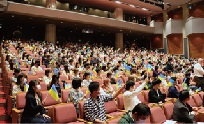 |
| Conclusion of the General Academic Cooperation MoU and the Student Exchange Agreement with three Ukrainian universities-- Taras Shevchenko National University of Kyiv, Borys Grinchenko Kyiv University, and National Aviation University. Support for: Transportation costs to Japan: Fully covered Living expenses: Living allowance provided, dormitory and meal fees waived Educational support: Financial support for living, Japanese language education and participation in international exchange events |
Special lecture by the His Excellency Sergiy Korsunsky, Ambassador Extraordinary and Plenipotentiary of Ukraine to Japan on "History and Culture of Ukraine's Cossack People held. |
| May 9, 2022 | May 19, 2022 |
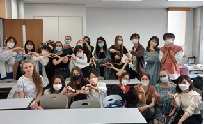 |
 |
| Of the 12 Ukrainian students accepted on the exchange program by Toyo University, three who arrived in Japan earlier visited Toyo University to greet the University’s management, faculty members and relevant staff members. The students started their study at the University starting from mid-May. | The Toyo University Center for Social Contribution held three special lectures on “The Current State of Ukrainian People and Children.” Lecture 1: “Let’s Learn about What’s Happening on the Ground and Think about What We Can Do” (May 19) Lecture 2: “Support for Ukrainian Refugees and Children: A Report from on the Ground in Romania” (June 16) Lecture 3: Supporting Ukrainian People in Japan (July 15) |
| July 4, 2022 | November 11, 2022 |
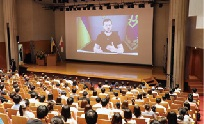 |
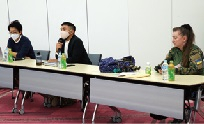 |
| Special online lecture by the President of Ukraine, Volodymyr Zelenskyy | Symposium, “Thinking about the War in Ukraine,” held at the Department of Media and Communications, Faculty of Sociology. |
| January 20, 2023 | January 30, 2023 |
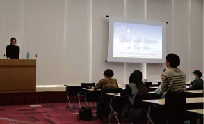 |
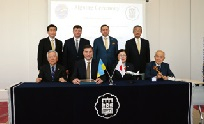 |
| “Stand with Ukraine in Toyo University: Study and Research Presentation by Ukrainian Students and Researchers” | The President of National Aviation University, Ukraine, visits Toyo University and to renew the concludes a student exchange agreement. Student exchange agreements with the remaining two Ukrainian partners are also to be renewed. |
| February 21, 2023 |
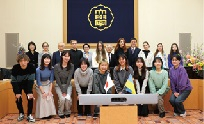 |
| Farewell Ceremony for the eight students who finished their exchange period at Toyo University and returned to Ukraine. |
| With Ukrainian students losing opportunities to study domestically due to Russia’s military action, at Toyo University, we came up with the idea to support students by providing them with opportunities for study. All of the Ukrainian students we have accepted have been able to share their learning and extracurricular experiences through classes and dormitory life with Toyo Students from Japan and overseas. On the other hand, Japanese students have gained a deep understanding of Ukraine's history, culture, and social situation and have been able to renew their ideas about Japan. I believe the friendship and exchange experience cultivated at Toyo University will become a foundation of future peacebuilding for the students. |
 |
| Etsuko Yaguchi, President of Toyo University |
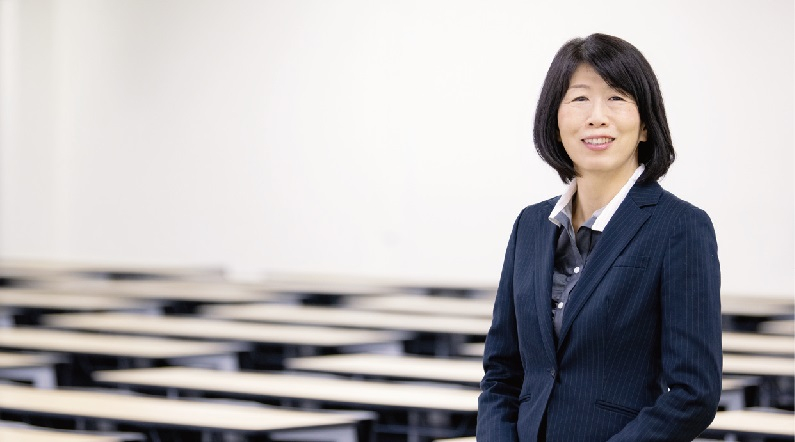
Professor, Department of International Culture and Communication Studies, Faculty of Letters
Nami Hirahata
Specialization: Japanese education
Profile
Dispatched to Tashkent State University of Oriental Studies (Uzbekistan), Taras Shevchenko National University of Kyiv (Ukraine), Baku State University (Azerbaijan), and Moscow State University (Russia) by the Japan Foundation and the Society for Promotion of Japanese Diplomacy as a NIS Japanese education specialist from 1998 to 2004. Hirahata worked at the Center for the Settlement and Facilitation of Returnees from China, Graduate School of the University of Tokyo, and Shiga University before assuming her current position.
Support is Something Very Natural. “Mutual” Support for Ukraine
For two years from 1999, I was dispatched to Ukraine by The Japan Foundation (a special legal entity supervised by the Ministry of Foreign Affairs responsible for Japan’s international cultural exchange programs) and taught Japanese at the Taras Shevchenko National University of Kyiv. It was a challenging period, with the chaos from the breakdown of the Soviet Union still present. However, I was given a warm welcome as a person coming alone from Japan. I feel that the days I spent in Ukraine were the starting point of my career as a researcher of Japanese Education. Words cannot describe the shock I felt when I saw that the avenues where I walked with students and Independence Square, where I celebrated the new millennium, were shown on TV as centers for the defense of Kyiv.
Immediately after the military action in February, discussions led by President Yaguchi about how to respond at Toyo University began. I was of the opinion that it would be better to conclude agreements with Ukrainian universities and host students rather than host refugees. A university is not a place to heal physical wounds and has no way of protecting people who are being directly attacked. However, there are things that only an educational institution can do. That is, hosting exchange students chosen by Ukrainian universities—in other words, young people whom local people want to entrust their future to, and developing them into people who can play an active role in future reconstruction and returning them to their hometowns. I believed this was the most effective way for the university to fulfill its responsibility. Toyo University concluded agreements with three Kyiv universities in April and accepted students from May. This was a rapid and distinctive response like no other in Japan and was also commended by the Embassy of Ukraine in Japan.
The three universities with which Toyo concluded agreements are all prestigious schools, and the students from these universities are all very talented. Many students can speak Japanese and are studying with Toyo students and interacting each other. I supervise the Toyo University Japanese language teacher development program, so I left the support of the Ukrainian students to students studying to become Japanese language teachers. However, as time went on, I began to see more situations where I felt that the Japanese students were the ones being supported. The Ukrainian students hug and comfort their Japanese counterparts when they cry because of the heartbreaking news reports from Ukraine or when something goes wrong. It also seems like the Japanese students were greatly inspired by the Ukrainian students, who boldly stated their opinions in discussions and gave unique, high-quality presentations.
“Support for Ukraine” has become a flurry of keyword in Japan. However, no matter your nationality, anyone may find themselves in a position where they need support. We are not doing something for someone else, but rather we are doing something very natural. We must not forget that we are all equal and that support is mutual. I think it is good to interact naturally and offer support as something very natural to our neighbors, the people of Ukraine, and anyone we come across.
|
Request for support for the study and research of Ukrainian students |